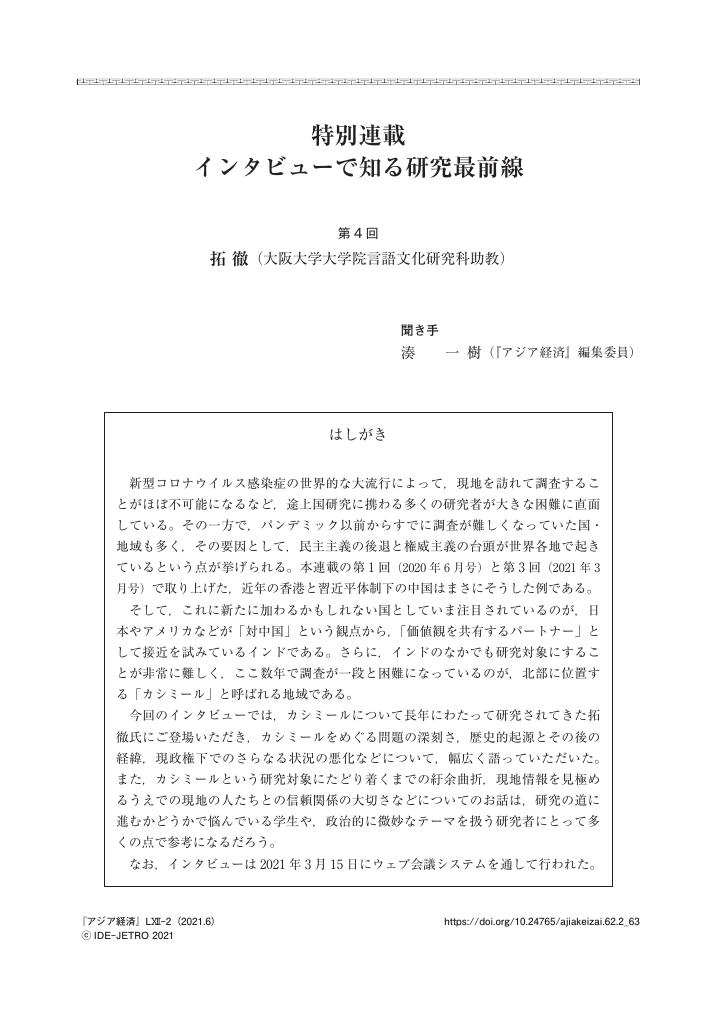32 0 0 0 OA インタビューで知る研究最前線 第4回
- 著者
- 拓 徹 湊 一樹
- 出版者
- 独立行政法人 日本貿易振興機構アジア経済研究所
- 雑誌
- アジア経済 (ISSN:00022942)
- 巻号頁・発行日
- vol.62, no.2, pp.63-85, 2021-06-15 (Released:2021-07-03)
- 参考文献数
- 5
11 0 0 0 OA インタビューで知る研究最前線 第3回
- 著者
- 武内 宏樹 湊 一樹 内藤 寛子
- 出版者
- 独立行政法人 日本貿易振興機構アジア経済研究所
- 雑誌
- アジア経済 (ISSN:00022942)
- 巻号頁・発行日
- vol.62, no.1, pp.50-72, 2021-03-15 (Released:2021-03-25)
- 参考文献数
- 3
8 0 0 0 OA 船底の汚れに因る船體抵抗の増加
- 著者
- 出淵 巽 藤嶋 範平 荒木 勤 出淵 巽 山本 武藏 菅 四郎 湊 一磨 平賀 譲
- 出版者
- 公益社団法人日本船舶海洋工学会
- 雑誌
- 造船協會會報 (ISSN:05148499)
- 巻号頁・発行日
- no.55, pp.57-100, 1935-03-25
The effect of fouling upon the resistance of ships was examined by the towing experiments with the ex-destroyer Yudachi at various stages of fouled surface after 4,75,140,225 and 375 days out of dock ; the speeds experimented with were up to 20 knots at each fouled condition. After these experiments the author studied the effect of fouling on the propulsive efficiency applying the above-mentioned results of towing experiments to the trial results of a first-class destroyer. The chief conclusions drawn from these investigations are : (1) Frictional resistance of ships having fouled bottoms can be expressed by the following formula : -R_f=f S V^<2-1>, where R_f=frictional resistance in kg., S=wetted surface area in m^2., V=speed of ship in knots, f=coefficient of frictional resistance which varies with the weight of fouled substances per unit area as shown in Fig.6. (2) Propulsive efficiency is affected scarcely by the bottom fouling.
5 0 0 0 海上気象及海洋觀測船凌風丸
4 0 0 0 OA 民主主義指標にみるアジア諸国の民主主義の現状
- 著者
- 湊 一樹
- 出版者
- 一般財団法人 アジア政経学会
- 雑誌
- アジア研究 (ISSN:00449237)
- 巻号頁・発行日
- vol.66, no.2, pp.42-51, 2020-04-30 (Released:2020-06-09)
- 参考文献数
- 13
Against a backdrop of growing concern over democratic decline, many scholars have debated whether democracy has been in a global recession for the past decade or so. Based on two major democracy indices, this article presents how political regimes in Asian countries have changed since the mid-2000s—the period when, according to its proponents, a global democratic recession started. Both the Freedom House and Varieties of Democracy (V-Dem) measures suggest that the Asian countries that have lower scores now than in 2005 are mostly emerging democracies, but that there is no clear pattern of democratic decline across the region since the mid-2000s. Notably, there was a significant gap between the two indices for some countries, including the Philippines and India, both of which are featured in the current issue of this journal. This seems quite natural, given the different methodologies adopted by the indices to measure democracy. I conclude that country case studies are critical for assessing the extent to which democracy indices can capture the political reality of each country and for determining which index is more sensible than others.
1 0 0 0 IR 「世界最大のロックダウン」はなぜ失敗したのか : コロナ禍と経済危機の二重苦に陥るインド
- 著者
- 湊 一樹
- 出版者
- 日本貿易振興機構アジア経済研究所
- 雑誌
- IDE スクエア -- 論考
- 巻号頁・発行日
- pp.1-18, 2020-07
1 0 0 0 OA ヒラメの人工種苗にみられた尿路結石の形成と性状
- 著者
- 酒井 勇一 斉藤 節雄 清水 幹博 山田 寿郎 湊 一郎
- 出版者
- 公益社団法人 日本水産学会
- 雑誌
- 日本水産学会誌 (ISSN:00215392)
- 巻号頁・発行日
- vol.62, no.5, pp.754-760, 1996-09-15 (Released:2008-02-29)
- 参考文献数
- 8
- 被引用文献数
- 6 8
The occurrence, chemical and crystallographic nature of the calculi, and their effects on the survivorship of larvae of Japanese flounder were investigated.Two types of calculi were distinguishied as to their colors and localities; most of calculi were a milk-white one found exclusively in the urinary bladder. Orange calculi, while comparatively few in number, were in both the kidney and the urinary bladder. Both types of calculi were mainly composed of calcium phosphate in amorphous forms, but the elements of each calculus was different. Calcium and phosphorus were detected in the milk-white calculi, while sulphur in addition to calciumand phosphorus were in orange calculi. The bladders containing milk-white calculi showed no histological changes in the kidney, but when orange calculi was observed in a proximal segment or a collecting tubule of the kidney, the lumen was abnormally expanded and the epithelium cells were flattened. But calculi-holding larvae did not show a specifically higher mortality compared to normal larvae.
1 0 0 0 OA 粗飼料給与時に発生したゴールデンハムスターのwet tail
1 0 0 0 OA 懷舊座談會記事
1 0 0 0 OA 西之島火山のその後の活動の経過と噴出物 : 日本火山学会1974年度春季大会
- 著者
- 小坂 丈予 湊 一郎 森 彰 大平 洋子
- 出版者
- 特定非営利活動法人日本火山学会
- 雑誌
- 火山. 第2集 (ISSN:04534360)
- 巻号頁・発行日
- vol.19, no.1, pp.39-40, 1974-07-01
稲わらのNaOH処理は、乾物重量あたり最終含水量35%および最終NaOH濃度0〜4%となるように、稲わらにNaOH水溶液を散布し、0〜21日間貯蔵した。4%NaOHで21日間の処理を行った時に、稲わらのin situ消化率での改善は最大であった。稲わらのリグニンおよびヘミセルロース含量とin situ消化率との間には負の相関が認められた。NaOH処理および無処理の稲わらの細胞壁に含まれるリグニンの特性を明らかにするために、細胞壁のフェノール性化合物の分析を行った。NaOH処理により、稲わらから遊離されるフェノール性化合物の量は、バニリン、p-クマル酸、フェルラ酸、p-ヒドロキシベンズアルデヒドの順に多かった。また、NaOH処理によって、稲わら中のエステル結合型のp-クマル酸の約50%が消失していた。稲わら中のセルロースのin situでの消化率は4%NaOHでの処理により著しく改善された。稲わらの細胞壁ヘミセルロース構成成分中でキシロースのin situ消化率は他の単糖類に比べて劣っていた。しかし、稲わら中のキシロースのin situでの消化率はNaOH処理によって改善された。In situ消化の間に、無処理の稲わらからは等量のグアイアシル-およびシリンギル-リグニンが放出された。他方、NaOH処理稲わらからはグアイアシル-リグニンに比べてシリンギル-リグニンがより多く放出された。走査電子顕微鏡による観察では、稲わらは、NaOH処理によって繊維組織が膨潤し、無数の繊維状物質の突出が確認された。この研究で得られた成績は、セルロースミクロフィブリルを包囲しているヘミセルロース多糖体とリグニンから構築されている網状構造、さらにはこれらの多糖体やリグニンに結合しているフェノール酸類がin situでの稲わら中のセルロースの消化を阻害していることを示唆している。



